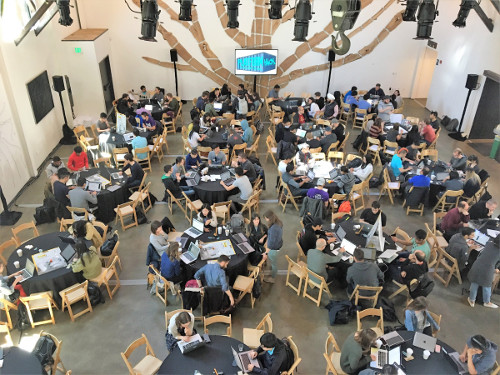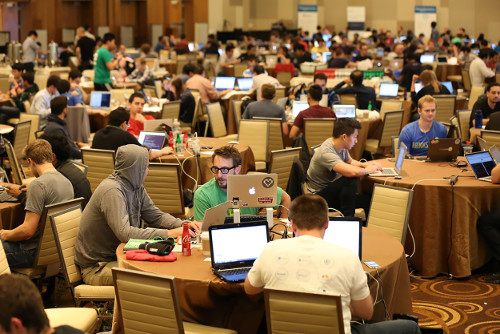
23 Nov Use Hackathons to improve your career

If you are a programmer, engineer, graphics designer, or business person, consider attending hackathons to improve your career. Most attendees just go for the prizes. Few are aware of this more important aspect. If you live in a large city you can attend 4 hackathons a year. You invest 4 weekends and often at no cost. Most are free, and they feed you. For that small investment, you add half a page to your resume by writing concise summaries of what you did. In a regular full time job, it can take years to make half a page of task descriptions. So hackathons are a highly leveraged investment.
There is much more. Often if you send your resume to a large firm, they run it thru a keyword check of their keywords. The higher the number of keywords in your resume, the greater the chance you meet their needs and thus the likelier they call you for an interview. But when you go to hackathons, you work on different projects. Just writing these up gives you more keywords and thus the chance of meeting the requirements of a new job.
And when you add a hackathon in the resume, always add the names of the corporate sponsors. These are usually tech firms like Google, Microsoft, Amazon, Apple. One reason they sponsor is that they have software or hardware that they want you to use. So afterwards you go back to your current or future jobs and promote their products (like a MSFT API). If you apply for a job at a non-tech firm, they might be interested in using those tech firms’ products. The names of the sponsors could well be keywords. Play the percentages in your favour.
The sponsors have another reason to sponsor. It gets them a table at the event, where their employees sit and explain their products. If a sponsor hires you directly, bypassing a recruiting firm, they don’t pay the recruiter’s fee, which is often 30% of your first year’s salary. A salary of $70k means they save $20k. Enough to pay their sponsorship of the event.
Most hackathons have about 100 attending. Of these, at least half are not interested in applying for a job at a sponsor. A very small job fair. In a large college with a job fair, there can easily be 4,000 attendees. And if you go to a job fair outside college, maybe 20,000. You know the drill. You dress up formally. Wait in a long queue. Get perhaps 5 minutes with a recruiter. Ever wondered that if you could get 30 minutes, you could pitch yourself far more effectively? So just being in a smaller job fair improves your odds. A hackathon is a de facto job fair with 50 people.
 Also you don’t dress up. No one does. A lot less stressful. In most hackathons, on the second day, the employees are often surfing the web, idle. In the first day, they were busy explaining the products to the competitors. On the second day, the attendees are busy competing. You can easily chat (I deliberately use this informal word) with an employee for half an hour. Make a good impression.
Also you don’t dress up. No one does. A lot less stressful. In most hackathons, on the second day, the employees are often surfing the web, idle. In the first day, they were busy explaining the products to the competitors. On the second day, the attendees are busy competing. You can easily chat (I deliberately use this informal word) with an employee for half an hour. Make a good impression.
What if the sponsor is not hiring? Still talk to their people at length. Just don’t try this on the first day. Explain your skills and ask them to keep you in mind for future openings. Get their cards. After the event, touch base judiciously to keep that connection active. Because in many firms, when they have an opening, they often ask existing employees if they know anyone. In part of course to avoid going thru an external recruiter.
Another reason to attend is of course the prizes. If you attend enough, you likely will be in a team that wins a prize. Put this in your resume. An important skill-related credential. Others judged that you were good enough to win.
If you join a team of strangers you get to know them over the course of the event. By the end, hopefully you pulled your own weight. If they did ditto, keep in contact with them afterwards. They don’t have to be in your field. In the firms they are at, just like with sponsors, there may be job openings suitable for you. Remember that working with each other for 2 or 3 days at the hackathon is a far lengthier professional interaction than simply meeting online or in person at an evening mixer. High bandwidth.
So if you go to several hackathons and make a point of joining new teams, you can effectively expand your professional social network.
Who are you? Suppose you are currently a student in university or even high school. Your biggest problem apart from graduating is finding things for your resume. Those hackathons can be very career oriented, compared to your classmates writing up a job in retail. Also, colleges offer resume and career advice. There are counselors. But there is a problem with the advice. It is well meant and correct, but too well known. If you follow the standard advice, and do those extracurricular events (glee club, debate club, soccer) and write these up, so too are many others, all over the country. When you submit a conventional resume with those activities, it’s harder to stand out.
Worse, an employer likely could ignore your extracurricular activities. She is interested in what is germane for her firm. Instead, a list of hackathons may be far more job related.
 Take a hard look at those activities. Are you really doing them because you like to do so or because you need them for your resume? Yet another advantage is that if you do the hackathons, ditch everything else extracurricular. You might actually save time. 4 hackathons a year is 4 weekends. All your current conventional activities might take more time.
Take a hard look at those activities. Are you really doing them because you like to do so or because you need them for your resume? Yet another advantage is that if you do the hackathons, ditch everything else extracurricular. You might actually save time. 4 hackathons a year is 4 weekends. All your current conventional activities might take more time.
Another angle is consider how hard it is to get that first real job. You have no prior work experience in the field. But you can argue that the hackathons were a halfway point between study and work.
Now suppose you are, say, 55 years. You think what’s in this for me? You may have a different issue. Perhaps you worry about being too long at one job. Or you fear being laid off. If you apply elsewhere, an employer could suppose that you have been going stale; that you are too old. Yes, age discrimination is illegal, but it happens. Taking part in hackathons can alleviate some of this. You work on many new tasks. You interact with other age groups, especially the 20s. It keeps you mentally flexible.
Hackathons are also useful whether you apply to a large firm or a startup. All want to push product out the door as rapidly as possible. But that is exactly what a hackathon is. An ad hoc team make a product in 2 or 3 days. Rapid prototyping. By the way, consider putting that phrase into your resume.
Yet another advantage is that hackathons are part of the current tech zeitgeist. (Unlike the dot com years.) If you can get to an in-person interview, the interviewer likely has never been to a hackathon. Just something he’s read about. It gives you and him something to talk about. Icebreaker. You can guide that conversation. Often an interview is where the interviewer is trying to assess some interpersonal aspect, and not just the business qualifications. Can you explain something and interact with others in a professional context?
There is more. One problem with being in a regular job is if you get fired. When looking for the next job, how do you explain? Consider hackathons. You join a team and mess up. They ask you to leave. You don’t have to put this hackathon in your resume. You can bury your mistakes. No one expects you to attend every hackathon in town.
Thus far I used the estimate of 4 hackathons equals half a page in the resume, and you do these in a year. What happens after several years? Multiple pages. There is standard advice of a 1 or 2 page resume. Fine. You now have material to accurately customize each resume to the firm you are submitting it to.
You will never need to exaggerate or fabricate your resume.
But as night follows day, and especially if enough people follow my advice, some will take shortcuts. They will write up hackathons they never attended.
What can you do? In hackathons you attend, take plenty of photos of yourself in the venue. Sitting and working at a table with the rest of your team. Many hackathons also have banners for the event. Take photos of you et al near those, and by the sponsor tables. Verisimilitude.
And if your team wins a prize, absolutely take a photo of your team with the prize, maybe on the stage with the sponsor.
In your social media, put the photos and short descriptions up soon after the event. They get a timestamp, made not by you but by the social website. Imagine then some 10 years later, if recruiters search you on the Web. They will find plenty of contemporaneous documentation. This is how you fight the faker bozos. Get to the point where no one will question the veracity of your resume.
Even aside from this, you should take and post the photos anyway. It is already common for a firm to search candidates on the Web. While others post awkward photos of themselves, you’re getting ahead.



No Comments